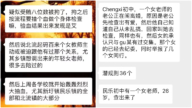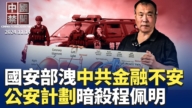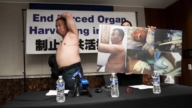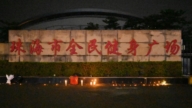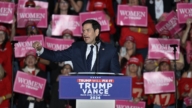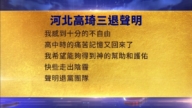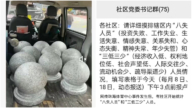【新唐人2013年02月18日訊】中共總書記習近平去年12月在廣東視察時,對黨內人士說,儘管中國有幾十年的經濟快速增長,仍然必須「深刻記取前蘇聯倒臺的教訓」。在廣東這個活躍的資本主義省份,他要求中共回到傳統的列寧主義。《紐約時報》近期報導了習近平關於「蘇聯教訓」的講話。報導認為,習近平透露出一種憂慮與恐懼,擔心中國存在的各種問題可能會把黨壓垮。
《紐約時報》報導,當中國(共)新領導人習近平在視察中國南方時,他在公眾面前把自己推崇為跟隨鄧小平步伐的大膽改革家,但與此同時,他在私下裡對共產黨官員卻有另一番教導。
習近平說,蘇聯爲甚麼會解體?蘇共為甚麼會垮臺?一個重要的原因是:理想信念動搖了。習近平還表示,中國不能在根本問題上發生顛覆性錯誤,這種情況如果出現,是無法挽回和無法彌補的。
這些話出自一份他的講話總結稿,這份文件在官員中傳閱,但並未由官方新聞媒體公開發佈。
報導說,前記者、獨立評論員高瑜是第一個公開習近平這些講話的人,她把這些話發表在了博客上。三名知情人士曾經從官員或官方報紙主編那裏看到這份文件,證實了文件的真實性。因為討論黨內事務有遭受處罰的危險,他們是以匿名的身份接受採訪。
報導分析,這一消息顯示,中共黨內對於改革可能會導致中共垮臺感到憂慮。
時事評論員林子旭:「不管習近平談到這一問題的初衷是甚麼,他剛剛上臺沒多久就直接把蘇聯解體的問題拿出來講,足見他心中對中共政權的不自信。」
那麼,習近平所講的到底是對甚麼信念動搖了呢?時事評論員林子旭指出,是共產黨鼓吹的所謂共產主義信念。
林子旭:「時間走到2013年,今天中共的黨員不僅僅是一個動搖的問題了,很多中共高官,已經對中共徹底失去信心,甚至已經產生反感了,民心更是已經一邊倒的開始棄共了。大廈將傾,只有傻瓜才會願意為一個腐朽的體制站臺,今天中共的一些打手還不就是,想要弄些錢財和中共站在一起的嗎?有個風吹草動,我想這些人跑的可能比誰都快。」
旅美中國問題研究人士張健表示,中國目前的情況和前蘇聯垮臺前一樣,有過之而無不及。
旅美中國問題研究人士張健:「比如通貨膨脹,民怨載道,所有的東西都被寡頭集團壟斷,黑幫盛行、腐敗重生,經濟體制改革走入死胡同,這和前蘇聯是非常一致的。」
《紐約時報》指出,「推行改革」與捍衛黨的自上而下「權力之間的衝突」,一直是中國走上經濟改革之路以來一個永恆的主題。在習近平上臺後,這種矛盾已變得尤其尖銳。
林子旭:「習近平上臺以後,反腐的雷聲雖然很大,但是雨點兒卻不大,而且反腐的界限非常鮮明,副省級官員被拿下了好幾個,更小的官員短時間之內就 可以被搞定十幾名。但是像周永康這樣的人已經被明確的舉報了出來,我們卻沒有看到中共高層的任何反應,相反舉報人的微博卻被屏蔽了。」
高瑜引述「哈佛大學費正清中國研究中心」教授麥克法誇爾對習近平新中央的預測,麥克法誇爾認為:「中共內部改革的可能性很小,恐怕要靠大規模突發事件從外部觸發改革。」
而林子旭指出,不論誰,有多大的本事,費盡多少心思,也挽救不了遙遙慾墜的中共獨裁統治。
採訪編輯/常春 後製/周天
New York Times: Xi Jinping Warns of “Lessons of the Former Soviet Union”
Xi Jinping told party insiders “despite decades of heady economic growth, China must still heed the ‘deeply profound’ lessons of the former Soviet Union” during his visit to Guangdong in December. In a province famed for its frenetic capitalism, he demanded a return to traditional Leninist discipline. New York Times reported Xi’s talk on “lessons from the Soviet Union”. The report stated that Xi‘s talk betrayed his fear and worry that social problems in China might cause the Party’s collapse.
As reported by New York Times, “When China’s new leader, Xi Jinping, visited the country‘s south to promote himself before the public as an audacious reformer following in the footsteps of Deng Xiaoping, he had another message to deliver to Communist Party officials behind closed doors.”
“Why did the Soviet Union disintegrate? Why did the Soviet Communist Party collapse? An important reason was that their ideals and convictions wavered,” Mr. Xi said. “We absolutely cannot allow any subversive errors when it comes to the fundamental issues,” Mr. Xi told party officials in Guangdong. “If that happens, there will be no going back.”
A summary of Xi’s comments has circulated among officials but has not been published by the state-run news media.
As reported, “Gao Yu, a former journalist and independent commentator, was the first to reveal Mr. Xi‘s comments, doing so on a blog. Three insiders, who were shown copies by officials or editors at state newspapers, confirmed their authenticity, speaking on the condition of anonymity because of the risk of punishment for discussing party affairs.”
The report further analyzed that Xi’s comments betrayed a fear that reform might overwhelm the party.
Commentator Lin Zixu: “No matter what Xi’s real intention was when he talked about the disintegration of the Soviet Union right after he took office. It does show quite clearly that he lacks confidence in the Party.”
When Xi said that the ideal wavered in the Soviet Union, what did he mean? Li Zixu says that the ideal was so-called communism.
Li Zixu: “Now it‘s 2013, and the communist ideal is not only wavering among CCP members. In fact, even a lot of senior have already lost their confidence in the party. The Party has lost popular support. The party is collapsing, and only idiots are willing to collapse together with it. The bullies hired by the Party are only working for money. Once they sense that the party is collapsing, they will run away immediately.”
Zhang Jian, Scholar in China’s Issues, stated that the situation in China is exactly the same if not worse than that in the Soviet Union before it collapsed.
Zhang Jian: “For example, inflation, discontent, monopoly, gangsterism, corruption and deadlock of economy, all of those phenomena were rampant in the Soviet Union before it‘s disintegration.”
In the New York Times it is stated that “The tension between embracing change and defending top-down party power has been an abiding theme in China.” “Mr. Xi has come to power at a time when such strains are especially acute.”
Li Zixu: “Since Xi Jinping came to power, anti-corruption has been raised in high profile. However, it has not brought results. Yes, a few provincial officials were taken down, and tens of junior officials have been taken down. However, senior officials, like Zhou Yongkang, have been reported for corruption, but nothing has happened to Zhou. Also of concern is that, those who reported Zhou were screened in their online microblogs.”
“Roderick MacFarquhar, Harvard Professor, predicted that the likelihood of the CCP reforming from within was very small, he said that reform would probably only be triggered by external, large-scale and eruptive events,” Gao Yu quoted Professor MacFarquhar’s comments.
Li Zixu has stated that nobody will be able to save the CCP from collapsing.


